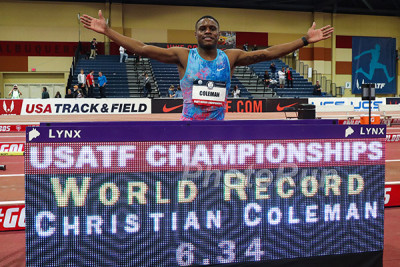Christian Coleman’s Ban For Missing Three Drug Tests Is Upheld; World’s Fastest Man Will Miss the 2021 Olympics
By Jonathan Gault
October 27, 2020
Christian Coleman, the reigning world 100-meter champion and fastest man in the world in 2017, 2018, and 2019, is set to miss next year’s Olympics after a World Athletics Disciplinary Tribunal upheld his two-year ban for missing three drug tests in 2019, a violation technically called a whereabouts suspension. Coleman, 24, who narrowly avoided a whereabouts suspension prior to last year’s World Championships, is suspended until May 13, 2022. Coleman’s lawyer Howard Jacobs told NBC Olympic Talk that Coleman is appealing the decision to the Court of Arbitration for Sport.
The tribunal had the option to reduce Coleman’s ban from two years to one, based on his degree of fault, but said it could find no reason to do so.
“The Athlete’s attitude to his obligations can fairly be described as entirely careless, perhaps even reckless,” the decision read.
Coleman was charged after registering three whereabouts failures in 2019. Here’s what happened with each one.
January 16, 2019: Missed test. Coleman did not contest this missed test. Coleman claims his weight session had been moved up, from 9 a.m. to 8 a.m., and he forgot to update his one-hour window.
April 26, 2019: Filing failure (backdated to April 1). Coleman contested this failure.
Coleman’s whereabouts form specified he would be in Lexington, Ky. He listed a regular activity (practice between 2 and 5:30 p.m.) and a one-hour window of 7:30 – 8:30 p.m. A doping control officer (DCO) arrived at Coleman’s residence in Lexington at 12:09 p.m. ET and called Coleman once he could not be located.
Coleman told the DCO that he was not in Lexington but instead in Des Moines, Iowa, for the Drake Relays. At 12:13 p.m. ET — immediately after the call — Coleman changed his one-hour window to 10 – 11 a.m. ET in Des Moines.
The tribunal upheld the filing failure, noting that Coleman had not updated his whereabouts information in a timely manner (causing the DCO to attempt to test him in Lexington when he was actually in Des Moines) and, furthermore, did not file a valid one-hour window on April 26 (since the 10 – 11 a.m. ET window had already passed by the time he updated it).
December 9, 2019: Missed test. Coleman contested this failure.
Coleman’s on hour drug testing window was set from 7:15 – 8:15 p.m. at his house in Lexington. He has admitted he was not at home for most of this time as he was Christmas shopping at a nearby mall, but he claimed he returned home before the end of the window and should not have been charged with a missed test. The DCO and his assistant claim they were at Coleman’s residence for the entire one-hour window and never saw him.
The tribunal sided with the DCO, with Coleman’s shopping receipts serving as damning evidence. One receipt showed Coleman purchased Chipotle at 7:53 p.m. Another showed that Coleman purchased 16 items from Walmart at 8:22 p.m. Coleman claims he returned home in between, watching the kickoff of that night’s Monday Night Football game that began at 8:15 pm. The tribunal rejected that explanation, explaining its reasoning below:
Although the Walmart Center is relatively close to the Athlete’s residence, it would have been simply impossible for him to purchase a chipotle at 7:53pm (the store being 5-9 minutes to his residence), drive home, park the car, go into his residence, eat the chipotle, then watch the kick-off of the football game which only started at 8:15pm, and thereafter go out again in his car, drive to the store and pick up 16 items at the Walmart Supercenter so as to be able to pay for them by 8:22 pm.
***
LRC Takeaways
It is hard to have any sympathy for Christian Coleman, who deserves to be banned
It has to be remembered that last year prior to Worlds Coleman almost was suspended for three whereabout violations and only missed out on a suspension when one of his whereabouts violations was backdated. After Coleman avoided suspension last year, the entire world knew he was sitting on two whereabouts failures until January 16, 2020. Yet rather than making his drug testing obligations his #1 priority for one hour each day until he had some leeway, Coleman chose to go shopping during his one-hour window on December 9. And rather than accepting his mistake, Coleman chose to blast the AIU for singling him out and then lied about returning home before the end of his one-hour window.
We’ll never know if Coleman doped — he has denied it, and there is no evidence to suggest that he has — but there is no excuse for going Christmas shopping during your one-hour window. If you’re the Olympic favorite sitting on two whereabouts failures, your #1 priority every day should be ensuring that you’re available to be tested. Coleman’s explanation is that, in the past, DCO’s have called him when they couldn’t locate him — but that is not a requirement. Coleman simply did not take the whereabouts system seriously enough, and was banned for his carelessness.
Some might be surprised that Coleman’s ban was upheld when the whereabouts suspensions of fellow sprinters Gabby Thomas and Salwa Eid Naser were overturned in recent months. But based on what we know about each case, it appears the right decision was made in all three instances. Thomas proved she was home before the end of her one-hour window for one of her missed tests and her case was dropped. In Naser’s case, the DCO knocked on the door of a storage unit instead of her apartment. But in Coleman’s case, there’s clear evidence that he was not where he was supposed to be during his window.
It’s worth noting that the AIU says it purposely didn’t call Coleman when trying to test him. Coleman wasn’t called during the test attempt because of his previous whereabouts failures and because the AIU was worried he had been “forewarned on previous tests”
When his suspension was announced in June, one of Coleman’s biggest complaints was that the DCO did not attempt to call Coleman once he could not be located on the night of his test. There is some logic to this line of thought — Coleman claimed his DCO had called him “literally every other time” that he could not be located for a test. Based on this pattern, Coleman may have assumed it was okay if he wasn’t home during his window as long as he was nearby and could quickly return if the DCO called him.
But the fact is, a phone call is not required under the rules, and Coleman should not be counting on the DCO to bail him out for not being at home during his one-hour window.
The question remains, however: why didn’t the DCO call Coleman when he could not be located?
Raphael Roux, the AIU’s Out-of-Competition Manager, said he ordered the DCO not to call Coleman for three reasons (quoted from the decision):
(i) the Athlete had in the relatively recent past missed four tests, and missed tests were always a warning sign in relation to an athlete
(ii) in the past there had been a combination of very good performances by the Athlete and missed tests
(iii) he had an impression that the Athlete might have been forewarned on previous tests
We’re not sure if the first two reasons actually matter. Even if an athlete had missed previous tests, the goal should still be to complete the test — not trick them into missing a test – and a phone call helps facilitate this goal. If, however, Coleman was genuinely being tipped off prior to previous tests — which Roux suggests — then it makes sense to issue a clear command to the DCO not to call him.
The address mixup Coleman described in June was not addressed
Back in June, Coleman claimed the DCO put down the wrong address in his unsuccessful attempt report. But this issue was not addressed during the tribunal’s decision, which suggests that the DCO was, indeed, at the correct location. (The DCO also provided a timestamped photo from the entrance to Coleman’s residence complex on the night in question).
The tribunal elected not to reduce Coleman’s suspension — his previous run-in with USADA and criticism of the AIU didn’t help him
One of the hopes Coleman and his supporters were clinging to was that, even if he was banned, his ban could be reduced from two years to one based on his degree of fault. Olympic 100m hurdles champion Brianna Rollins, for instance, had her whereabouts suspension reduced in 2017 after an arbitration panel ruled she showed “no evidence of avoiding testing, masking drug use, or using drugs.” Had Coleman’s ban been trimmed to one year, he’d be eligible to compete on May 13, 2021, giving him time to run the US Olympic Trials and Olympics.
But Coleman was not granted the same leniency, in part because Coleman had already barely avoided a whereabouts suspension in 2019 and still registered a third failure.
“Rather than learn with his experience with USADA, the Athlete’s attitude to his obligations can fairly be described as entirely careless, perhaps even reckless,” the tribunal wrote. “…We do not think there is any mitigation which can fairly be relied upon to reduce the sanction from the two-year period.”
Talk about Coleman’s suspension on our messagegboard: MB: Christian Coleman BANNED until May 2022 as AIU Tribunal upholds his ban for 3 missed drug tests
Related:
- Sept. 2019: Christian Coleman’s Dad Blasts LetsRun Co-Founder Robert Johnson after Johnson says Coleman should be drug tested every day for the rest of his career. “Robert Johnson is an unprofessional, irresponsible hack and an idiot … and I have no problem tell him to his face.”
- Sept. 2019: How Does the Whereabouts System Work for a Professional Athlete? We Asked Jenny Simpson to Explain It
- Sept. 2019: Why Was Christian Coleman Cleared? We Explain Everything You Need to Know About His USADA Case
- June 2020: World’s Fastest Man May Face An Olympic Ban For Missing Yet Another Drug Test
- June 2020: In Christian Coleman Case, Track & Field Cannot Win
- Oct. 2020: 2020 Has Been the Year of Whereabouts Failures. Why?


